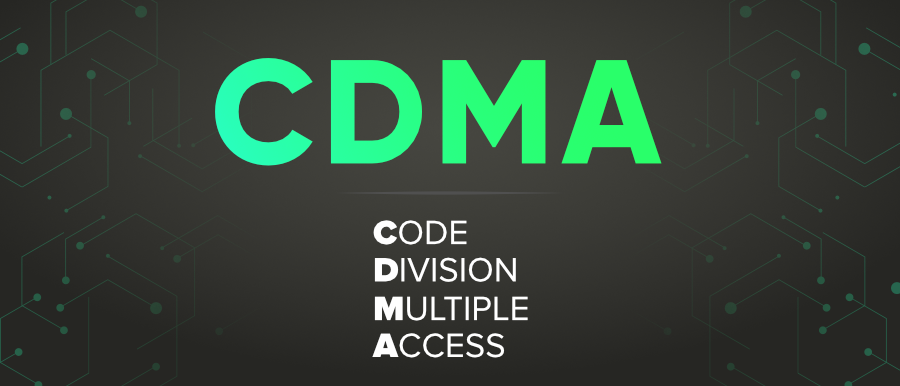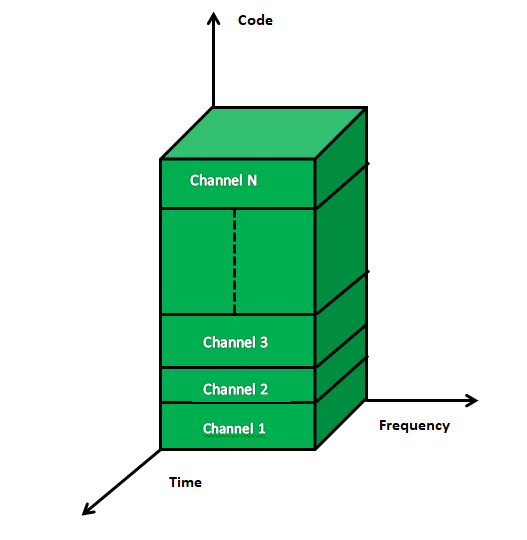CDMA Full Form
Last Updated :
12 Feb, 2023
CDMA stands for Code Division Multiple Access. It is basically a channel access method and is also an example of multiple access. Multiple access basically means that information by several transmitters can be sent simultaneously onto a single communication channel.

There are multiple users which are provided or assigned variant CDMA codes and thus the users can access the entire band of frequencies or the whole bandwidth. This method does not limit the frequency range of the user. Hence, with the help of CDMA, multiple users can share a band of frequencies without any kind of undue interference between them. CDMA makes the use of spectrum technology along with analog to digital conversion(ADC). It is thus used by various radio communication technologies. Mainly, it is used for mobile communication.
History
CDMA technology has been in use for a long time. In 1935, the first time this subject was published by Dmitry Ageev. CDMA also came in use during the time of World War-II in order to stop the efforts of jamming transmissions. Thus it made its application in the military field and was used in anti-jamming, ranging, etc. It was used in 1957 by Leonid Kupriyanovich while he was making a model of automatic wearable mobile phone. Finally, in the year 1993, the Telecommunications Industry Association(TIA) approved the standards for CDMA technology. 16 million subscribers were recorded to use the CDMA systems in September 1998. Currently, CDMA is being supported by 22 countries.

Characteristics of CDMA
- It allows more users to connect at a given time and thus provides improved data and voice communication capacity.
- A full spectrum is used by all the channels in CDMA.
- CDMA systems make the use of power control to eliminate the interference and noise and to thus improve the network quality.
- CDMA encodes the user transmissions into distinct and unique codes in order to secure its signals.
- In CDMA systems all the cells can thus use the same frequency.
- CDMA systems have a soft capacity.Thus there is no particular limit to the number of users in a CDMA system but with increase in the number of users the performance degrades.
Encoder for DS-SS CDMA
- The input provided to the CDMA encoder can be in the form of Pulse code modulation (PCM) encoded voice band signal or can be a digital signal from computer.
- It is multiplied with N bit, which is an unique chip code.
- The output of balanced modulator is the product code.
- In IF carrier it is used as an PSK modulation.
- The balanced modulator is sometimes referred to as multiplier.
- Further the modulated signal is then converted to RF band and is used for transmission purpose.
- The high power amplifier basically raises the level of power to a very high level and then the antennas transmit this signal.
- The encoder is also called as multiplexer.
Decoder for DS-SS CDMA

CDMA decoder
- The decoder helps in reconverting the RF signal to IF.
- A coherent PSK carrier is been obtained from IF.
- The chip code is been used by the receiver and it helps in synchronizing the receiver station’s code generator.
- The recovered chip is then multiplied with recovered PSK carrier to generate PSK modulated signal which contains PSK carrier and the chip code.
- The IF signal which is received, contains chip code, PSK carrier and data. In correlator it is compared with the received IF signal.
- The correlator helps in comparing this two signals and helps in recovering the original data.
- The decoder is also called as demultiplexer.
Advantages
- Increased user capacity is an advantage of the CDMA as it supports a lot more users in comparison to TDMA or FDMA.
- CDMA is more secure as the information transmitted is below the noise floor making the intrusion of the spectrum difficult.
- CDMA systems have comparatively fewer dropouts than GSM. Thus, it can also be used in rural areas.
- The cost of the calls in CDMA is lower in comparison to the cost in GSM.
- CDMA provides a high quality of voice with almost no noise during the calls.
- Using CDMA problems like multipath and fading do not occur.
- CDMA has a very low power requirement.
Disadvantages
- CDMA lacks the facility of international roaming which is provided by GSM.
- Since there is no limit to the number of users the system performance degrades with an increase in the number of users.
- Self-jamming problem occurs in CDMA systems because of loss of orthogonality.
- The problem of channel pollution occurs in CDMA systems which thus degrades the quality of audio.
- Since most of the mobile companies use GSM thus there is a lack of handsets for CDMA technology.
Share your thoughts in the comments
Please Login to comment...